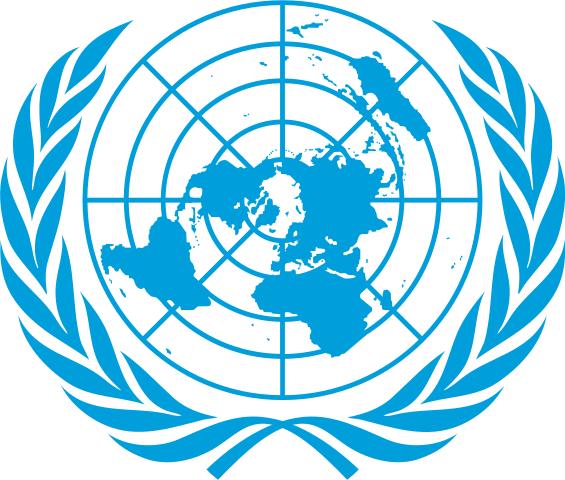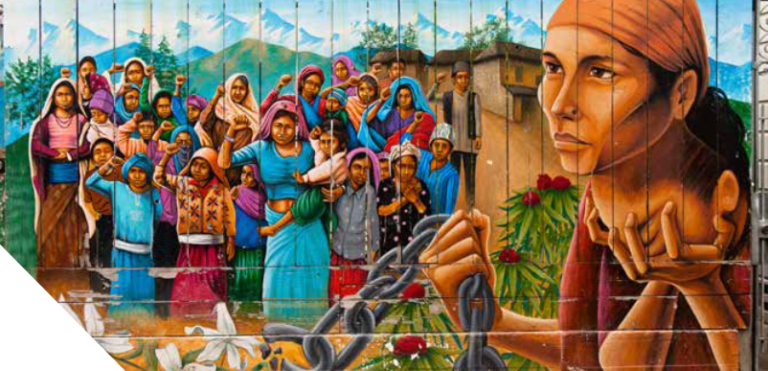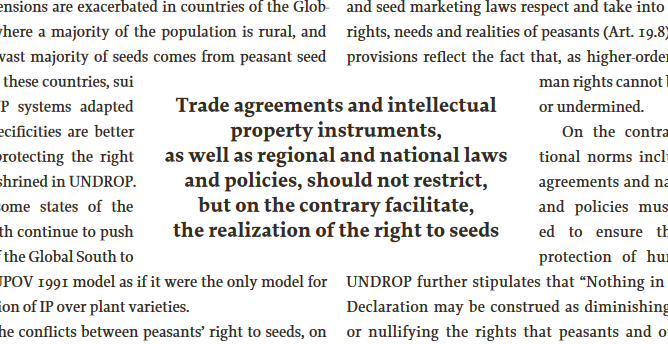UNDROP in the Work of United Nations Human Rights Mechanisms
Since its adoption in 2018, UNDROP has been included in the work of some United Nations human rights mechanisms. We present how this has been done in this contribution, in which we also present the new Working Group on the rights of peasants and other people working in rural areas created by the Human Rights Council to monitor UNDROP’s implementation.
Integrating UNDROP in the Work of the Human Rights Council and Special Procedures
UNDROP in the Universal Periodic Review of the Human Rights Council
When it created the Human Rights Council in 2006, the UN General Assembly decided that it would undertake ‘a universal periodic review, based on objective and reliable information, of the fulfilment by each State of its human rights obligations and commitments in a manner which ensures universality of coverage and equal treatment with respect to all States’.
At the Universal Periodic Review (UPR), all UN Member States are evaluated by their peers, who formulate recommendations for better implementation of human rights in the country under review. The state under review can then decide if it accepts or if it only takes note of the recommendations made.
Following the examples of Bolivia, South Africa, Portugal and Switzerland, who made UPR recommendations to push for UNDROP’s implementation in other countries, states should use the UPR in order to protect and promote the rights of peasants.
Creation of a new Special Procedure
UN special procedures are mandated by the Human Rights Council to promote and protect human rights. They have thematic mandates, for example on torture or the right to food, or mandates that cover all human rights in a specific country. They include special rapporteurs, independent experts, special representatives of the UN Secretary-General and working groups. They produce annual thematic reports, conduct country visits, and send communications to states on human rights violations. They can be renewed without limitation, while their mandate holders cannot serve for more than six years.
At its 54th session, from September 11th to October 13th 2023, the Human Rights Council
adopted a resolution on the rights of peasants and other people working in rural areas (A/HRC/RES/54/9). With this resolution, the Council created a Working Group on UNDROP, composed of 5 independent experts from the five UN regions. The Human Rights Council resolution gives the Working Group a broad mandate: to promote the dissemination and application of UNDROP; to identify gaps in its application and make recommendations to remedy them; identify and disseminate best practices from a wide range of sources; facilitate exchanges and international cooperation concerning UNDROP; work with relevant bodies of intergovernmental organizations and report to the Human Rights Council and the General Assembly of the United Nations. To fulfill this mandate, the Working Group will have the same competences as the other Special procedures, as described above.
At the 55th session (February-April 2024), the mandate holders were appointed as follows:
- Ms Uche Ewelukwa OFODILE (Nigeria)
- Ms Shalmadi GUTTAL (India)
- Mr Davit Hakobyan (Armenia)
- Ms Geneviève SAVIGNY (France)
- Mr Carlos Duarte (Colombia)
The creation of this Working Group fills an important accountability gap in the UN human rights system. This new body can act as a catalyst for the Declaration, providing visibility and important support to advance the promotion and protection of UNDROP rights by clarifying the implications of the Declaration, sharing best practices and key challenges, and recommending concrete measures to be adopted by States and other actors.
Examples of inclusion of UNDROP in the work of Special Procedures
Following the example of the UN Special Rapporteur on the right to food, who included UNDROP in three of its most recent reports on violence, on seeds, and on the Covid-19 pandemic, all UN special procedures should include UNDROP in their work.
Here are some examples of UN special procedures including UNDROP in their work.
In his 2020 report on private debt and human rights, the Independent Expert on the effects of foreign debt, explained that he was preoccupied by the debt of peasant families: “As land is sometimes collateral against loans contracted by small farmers, the risk of livelihood loss in the event of debt default is clear when they face a natural disaster, a bad harvest or dropping commodity prices, even though they should be protected in such situations by the United Nations Declaration on the Rights of Peasants and Other People Working in Rural Areas”.
The UN Special Rapporteur on the right to adequate housing, in her 2020 Guidelines for the Implementation of the Right to Adequate Housing, referred to UNDROP and stated that: “(a) Forced evictions as defined under international human rights law must be prohibited in all circumstances, regardless of ownership or tenure status of those affected. Victims of forced evictions must receive adequate compensation, reparation and access to housing or productive land as appropriate”.
The Working Group on discrimination against women and girls, in 2020, in its report on women’s human rights in the changing world of work, recommended to States to “ensure women’s equal rights to own, control and access land, credit and other productive resources” and to guarantee “the enjoyment without discrimination by peasant women and other women working in rural areas of all the human rights and fundamental freedoms set out in the United Nations Declaration on the Rights of Peasants and other People Working in Rural Areas, including decent employment, equal remuneration and social protection benefits, access to income-generating activities and freedom from all forms of violence”.
The Special Rapporteur on human rights and the environment included many references to UNDROP in his 2020 report on a healthy biosphere. For him: “There is growing recognition of the linkages between human rights and the health of the biosphere. It is acknowledged in recent United Nations declarations that indigenous peoples and peasants have rights “to the conservation and protection of the environment and the productive capacity of their lands””. Referring to UNDROP, he underlined that “States have particular obligations to indigenous peoples and local communities and peasants. The top priority involves recognizing their land titles, tenures and rights, acknowledging the existence of different customs and systems, including collective ownership and governance models. (…) States are obligated to prevent human rights abuses – evictions, displacement, beatings, torture and murder – arising from exclusionary and militarized conservation. States must “take appropriate measures to promote and protect the traditional knowledge, innovation and practices of peasants and other people working in rural areas, including traditional agrarian, pastoral, forestry, fisheries, livestock and agroecological systems relevant to the conservation and sustainable use of biological diversity””.
The Special Rapporteur on human rights and the environment also incorporated UNDROP in his 2021 report documenting the catastrophic environmental, health, and human rights consequences of industrial food systems, unhealthy diets and food waste, but also offering human rights-based guidance for transformative action moving forward.
The Special Rapporteur on water and sanitation also relied on UNDROP to frame its 2022 General Assembly report on the fulfillment of the human rights to safe drinking water and sanitation in impoverished rural communities.
Inclusion of UNDROP in Human Rights Council resolutions
The work to include UNDROP at all levels of the UN, carried out by the Special Procedures, States and civil society organizations alike, has borne new fruit, with renewed interest on the part of the Human Rights Council. This interest was marked first and foremost by the creation of the Working Group on UNDOP, as already mentioned, but also by the inclusion of UNDROP in other Council resolutions.
This was the case in the resolution to promote and protect economic, social and cultural rights in the context of the fight against inequalities, adopted at the end of the 54th session of the Council in October 2023, which incorporated UNDROP into the legal framework underpinning the resolution. Another example is the resolution on the right to food adopted at the end of the 55th session of the Council in April 2024, which, on the basis of UNDROP, recognized “the contribution made by peasants, small farmers, family farmers and other people working and living in rural areas, artisanal fishers and small-scale fishermen from all regions of the world contribute to the development and realization of the right to food, food security and nutrition, which are essential to the achievement of the Sustainable Development Goals and to the implementation of the 2030 Agenda for Sustainable Development”.
Calls for action inside the UN
On the occasion of UNDROP’s first anniversary on 17 December 2019, nine UN special procedures and four members of UN treaty bodies released a joint statement in which they committed to protect the rights of peasants and other rural workers, to integrate these rights in the exercise of their mandates, and to provide guidance to states on how they can implement them. They called on the Human Rights Council to create a new special procedure to monitor UNDROP, and on states to protect human rights defenders of land, environment and natural resources, who are the first victims of criminalization, intimidation and attacks against their physical integrity and life. The mandate holders underlined that, peasants and other rural workers “shall be recognized as agents of change and essential actors in the local, national and international implementation of (…) UNDROP, and not just as victims of discrimination or in terms of vulnerability”. They called for the creation of a UN Voluntary Fund for peasants and other rural workers to support their participation in the activities of the UN system. They added that the effective implementation of UNDROP will not be realized without meaningful grassroots engagement.
On 16 December 2022, twelve UN special procedure mandate holders released a joint statement on the need for action on UNDROP, in which they highlighted that “besides their disproportionate exposure to environmental degradation, toxic substances, land grabbing and climate change, peasants and rural workers also suffer from the burdens caused by poverty, hunger and malnutrition. More recently, their situation has become even more dire, due to the direct effects of the COVID-19 pandemic, as well as its subsequent harmful impact on food and cost-of-living crisis”.
UN special procedures commended peasants and other rural workers across the world who have shown great resilience in the face of multiple challenges and intersectional oppression facing them and their communities, and they called on states to do more to protect, support and listen to them. For the special procedures, “UNDROP provides a framework to enable a just transition to a food system where biodiversity and human rights flourish. (…) UNDROP provides not only a recognition of peasants’ and rural workers’ rights and contributions, but also serves as a roadmap for States, the UN, business enterprises and other stakeholders to take concrete actions on the ground”.
More recently, a new UN human rights actor, the Office of the High Commissioner for Human Rights, has begun to cite UNDROP in its work and to highlight it. In its report on measures to minimize the adverse effects of climate change on the full realization of the right to food, presented in March 2024, the Office of the High Commissioner stressed that it is essential to take measures to protect the rights and knowledge relating to food of peasants, local populations and other people living in rural areas, in accordance with international legal instruments, including UNDROP.
In addition, the Office of the High Commissioner for Human Rights has highlighted virtuous states in this field, encouraging other member states to draw inspiration from the good practices already established in certain national legislations in order to contribute to the implementation of UNDROP. One example is the congratulations addressed to Colombia in the March 2024 OHCHR report on the human rights situation in Colombia. These congratulations concerned the reform of Article 64 of the Colombian Constitution, which recognizes peasants as subjects of law and special protection, and the approval of Legislative Act 03 of 2023, which creates a specialized agrarian and rural jurisdiction.
Integrating UNDROP in the Work of Treaty Bodies
UN treaty bodies are composed of 10 to 25 independent experts. They monitor the implementation of UN human rights treaties. They examine periodic reports from States Parties on the steps taken to implement UN human rights treaties. They also examine communications alleging violations of the rights protected by UN human rights treaties. They present recommendations to States Parties in the form of ‘concluding observations’ at the end of the examination of periodic reports, and ‘views’ at the end of the examination of communication procedures. They also adopt general comments or general recommendations in which they define the rights and states’ obligations enshrined in the UN human rights treaties. And they adopt statements on current issues or situations that are particularly relevant for the implementation of UN human rights treaties.
All UN treaty bodies should also include the monitoring of UNDROP in their work.
The fact that UNDROP builds on a number of UN human rights treaties that they monitor, including the International Covenant on Economic Social and Cultural Rights (ESCR), the International Covenant on Civil and Political Rights, the Convention on the Elimination of All Forms of Discrimination Against Women (CEDAW), the Convention on the Rights of the Child, and the International Convention on the Protection of the Rights of All Migrant Workers and Members of Their Families, will make the work of UN treaty bodies easier in terms of considering how state obligations under their particular treaty ought to be interpreted in the context of the rights of peasants and other rural workers.
In their joint statement released with UN special procedures in December 2019, four members of UN treaty bodies – the Committee on Migrant Workers, the Committee on the Elimination of Discrimination Against Women (CEDAW Committee), the Committee on ESCR, and Committee on the Rights of the Child – committed to integrate, or recommend the integration of the monitoring of UNDROP in the exercise of their mandates, to protect the rights of peasants and other rural workers, and to provide guidance to states on how they can implement UNDROP. Since then, a few references to UNDROP have been made in UN treaty bodies’ work.
Committee on ESCR
In its Concluding Observations to Guinea in 2020, the Committee on ESCR recommended to the state to “progressively guarantee all peasants access to support programmes and agroecological solutions without discrimination, respecting the choice of each person, in accordance with UNDROP”.
The Committee also referred to UNDROP in its General Comment on Science and ESCR adopted in 2020. Using UNDROP it provided that: “the right to participate in and to enjoy the benefits of scientific progress and its applications in agriculture should preserve, not violate, the right of peasants and other people working in rural areas to choose which technologies suit them best”. The Committee also affirms : “States parties should take appropriate measures to ensure that agricultural research and development integrates the needs of peasants and other people working in rural areas and to ensure their active participation in the determination of priorities and the undertaking of research and development, taking into account their experience and respecting their cultures”.
More recently, it included several references to the rights of peasants and other rural workers in its General Comment on land and ESCR, adopted in 2022. In this General Comment, the Committee on ESCR for example called states to “avoid adopting policies to mitigate climate change, such as carbon sequestration through massive reforestation or protection of existing forests, that lead to different forms of land grabbing, especially when they affect the land and territories of populations in vulnerable situations, such as peasants or Indigenous Peoples.”
CEDAW Committee
In its General Recommendation on the rights of rural women, adopted in 2016, the CEDAW Committee made numerous references to the rights of peasant women, even if it was adopted before UNDROP. It is also important to note that in its Concluding Observations to Colombia in 2019, the CEDAW Committee for example recommended to the state to “consider incorporating the principles contained in UNDROP in legal and policy instruments regarding rural women”.
Human Rights Committee
In 2019, the Human Rights Committee became the first UN treaty body to refer to UNDROP in its case law, with its decision in Portillo Cáceres and Others v. Paraguay. In this case, the Human Rights Committee explained that Portillo Cáceres and members of his family – a peasant family that had been poisoned by agrochemicals used in nearby large plantations, which also polluted their land and other natural resources – depend on their crops, fruit trees, livestock, fishing, and water resources for their livelihoods. It added that they have a special attachment to and dependency on the land, using the words of and referring to UNDROP’s Article 1. The Human Rights Committee concluded that these elements can therefore be considered to fall under the scope of “home”, i.e., the place where a person resides or carries out his or her usual occupation. As the pollution has had direct repercussions on the Cáceres family’s crops, fruit trees, livestock, fishing, and water resources, their right to privacy, family, and home has been violated.
Integrating UNDROP into other international instruments
While UNDROP has been used as a reference by the various treaty bodies, the Declaration has also been recalled in various drafts incorporating the rights of peasants. In the draft International Covenant on the Right to Development of the 54th session of the Human Rights Council (A/HRC/54/50), its provisions were mentioned in the preamble. Moreover, Article 18 of this draft refers directly to the rights of peasants and other people working in rural areas, drawing inspiration from UNDROP. Indeed, it states that peasants and other rural inhabitants have the right to define their own development priorities and strategies, and the right to participate actively and freely in the formulation and implementation of laws and policies that affect their lives and livelihoods. It also states that States must consult and cooperate with these populations in a transparent manner before adopting laws or policies that could affect their rights.
The latest revised draft of the Declaration on Human Rights and International Solidarity (A/HRC/53/32*) sets out a series of arguments in favor of revision to take account of current events at the UN and around the world, as well as other key instruments such as UNDROP. Indeed, the Independent Expert’s report states: “Recalling the determination of States, enshrined in the United Nations Declaration on the Rights of Peasants and Other People Working in Rural Areas, to take a step forward in the commitment of the international community to achieve significant progress in human rights action, through an increased and sustained effort of international cooperation and solidarity, in particular with regard to the measures to be taken to cooperate in addressing the cross-border problems of land occupation faced by peasants and other people working in rural areas that straddle international borders. “








One Comment
Comments are closed.